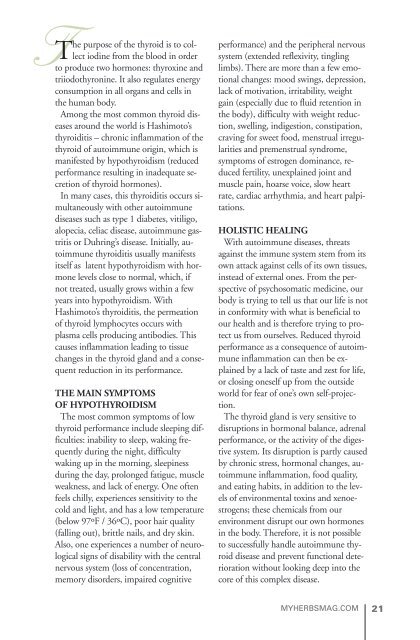My Herbs 1
Find out more on MYHERBS-STORE.COM. My Herbs is a special quarterly publication for anyone who is interested in alternative cooking, home grown herbs, and traditional or complementary medicine or healing methods, simply for everyone who wants to live in harmony with nature.
Find out more on MYHERBS-STORE.COM.
My Herbs is a special quarterly publication for anyone who is interested in alternative cooking, home grown herbs, and traditional or complementary medicine or healing methods, simply for everyone who wants to live in harmony with nature.
You also want an ePaper? Increase the reach of your titles
YUMPU automatically turns print PDFs into web optimized ePapers that Google loves.
he purpose of the thyroid is to collect<br />
iodine from the blood in order<br />
TT<br />
to produce two hormones: thyroxine and<br />
triiodothyronine. It also regulates energy<br />
consumption in all organs and cells in<br />
the human body.<br />
Among the most common thyroid diseases<br />
around the world is Hashimoto’s<br />
thyroiditis – chronic inflammation of the<br />
thyroid of autoimmune origin, which is<br />
manifested by hypothyroidism (reduced<br />
performance resulting in inadequate secretion<br />
of thyroid hormones).<br />
In many cases, this thyroiditis occurs simultaneously<br />
with other autoimmune<br />
diseases such as type 1 diabetes, vitiligo,<br />
alopecia, celiac disease, autoimmune gastritis<br />
or Duhring’s disease. Initially, autoimmune<br />
thyroiditis usually manifests<br />
itself as latent hypothyroidism with hormone<br />
levels close to normal, which, if<br />
not treated, usually grows within a few<br />
years into hypothyroidism. With<br />
Hashimoto’s thyroiditis, the permeation<br />
of thyroid lymphocytes occurs with<br />
plasma cells producing antibodies. This<br />
causes inflammation leading to tissue<br />
changes in the thyroid gland and a consequent<br />
reduction in its performance.<br />
THE MAIN SYMPTOMS<br />
OF HYPOTHYROIDISM<br />
The most common symptoms of low<br />
thyroid performance include sleeping difficulties:<br />
inability to sleep, waking frequently<br />
during the night, difficulty<br />
waking up in the morning, sleepiness<br />
during the day, prolonged fatigue, muscle<br />
weakness, and lack of energy. One often<br />
feels chilly, experiences sensitivity to the<br />
cold and light, and has a low temperature<br />
(below 97ºF / 36ºC), poor hair quality<br />
(falling out), brittle nails, and dry skin.<br />
Also, one experiences a number of neurological<br />
signs of disability with the central<br />
nervous system (loss of concentration,<br />
memory disorders, impaired cognitive<br />
performance) and the peripheral nervous<br />
system (extended reflexivity, tingling<br />
limbs). There are more than a few emotional<br />
changes: mood swings, depression,<br />
lack of motivation, irritability, weight<br />
gain (especially due to fluid retention in<br />
the body), difficulty with weight reduction,<br />
swelling, indigestion, constipation,<br />
craving for sweet food, menstrual irregularities<br />
and premenstrual syndrome,<br />
symptoms of estrogen dominance, reduced<br />
fertility, unexplained joint and<br />
muscle pain, hoarse voice, slow heart<br />
rate, cardiac arrhythmia, and heart palpitations.<br />
HOLISTIC HEALING<br />
With autoimmune diseases, threats<br />
against the immune system stem from its<br />
own attack against cells of its own tissues,<br />
instead of external ones. From the perspective<br />
of psychosomatic medicine, our<br />
body is trying to tell us that our life is not<br />
in conformity with what is beneficial to<br />
our health and is therefore trying to protect<br />
us from ourselves. Reduced thyroid<br />
performance as a consequence of autoimmune<br />
inflammation can then be explained<br />
by a lack of taste and zest for life,<br />
or closing oneself up from the outside<br />
world for fear of one’s own self-projection.<br />
The thyroid gland is very sensitive to<br />
disruptions in hormonal balance, adrenal<br />
performance, or the activity of the digestive<br />
system. Its disruption is partly caused<br />
by chronic stress, hormonal changes, autoimmune<br />
inflammation, food quality,<br />
and eating habits, in addition to the levels<br />
of environmental toxins and xenoestrogens;<br />
these chemicals from our<br />
environment disrupt our own hormones<br />
in the body. Therefore, it is not possible<br />
to successfully handle autoimmune thyroid<br />
disease and prevent functional deterioration<br />
without looking deep into the<br />
core of this complex disease.<br />
MYHERBSMAG.COM<br />
21












